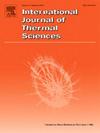Simulation study of heat transfer in the space under the clothing of mining ventilation suits in typical human labour positions
IF 4.9
2区 工程技术
Q1 ENGINEERING, MECHANICAL
International Journal of Thermal Sciences
Pub Date : 2024-10-14
DOI:10.1016/j.ijthermalsci.2024.109423
引用次数: 0
Abstract
The objective of this study is to examine the distribution of space under a ventilated suit when the human body is wearing a ventilated suit with different piping structures in labor postures, such as lifting the arms and bending the waist. Additionally, the study aims to investigate the impact of the space under the ventilated suit on heat transfer through numerical simulation, with the goal of identifying the optimal piping design. The study demonstrates that in an inhomogeneous space, the airflow is susceptible to turbulence, which results in the accumulation of heat. Furthermore, the implementation of distinct air flow patterns within the transverse and longitudinal piping structures of the ventilated suit can result in notable alterations to the heat transfer process and the overall cooling effect. The transverse piping structure offers superior support and a more uniform air flow distribution, thereby significantly enhancing the cooling effect of the ventilated suit. In contrast, the longitudinal piping structure is designed to concentrate the air flow on the back side, resulting in a comparatively weaker ventilation effect on the front side. A comparison of the weights of the two piping structures using the entropy value method revealed that the transverse piping structure had a weight that was approximately 4.5 % higher than that of the longitudinal piping structure. This finding suggests that the cooling effect of the transverse piping structure is more pronounced.
典型人体劳动位置下矿用通风服服下空间传热模拟研究
本研究的目的是研究人体在抬臂、弯腰等劳动姿势下穿着具有不同管道结构的通风服时,通风服下的空间分布情况。此外,该研究还旨在通过数值模拟研究透气服下的空间对传热的影响,从而确定最佳的管道设计。研究表明,在不均匀的空间中,气流容易受到湍流的影响,从而导致热量积聚。此外,在通风服的横向和纵向管道结构中采用不同的气流模式,可显著改变传热过程和整体冷却效果。横向管道结构可提供更好的支撑和更均匀的气流分布,从而显著增强通风服的冷却效果。相比之下,纵向管道结构的设计将气流集中在背面,导致正面的通风效果相对较弱。使用熵值法对两种管道结构的重量进行比较后发现,横向管道结构的重量比纵向管道结构高出约 4.5%。这一结果表明,横向管道结构的冷却效果更为明显。
本文章由计算机程序翻译,如有差异,请以英文原文为准。
求助全文
约1分钟内获得全文
求助全文
来源期刊

International Journal of Thermal Sciences
工程技术-工程:机械
CiteScore
8.10
自引率
11.10%
发文量
531
审稿时长
55 days
期刊介绍:
The International Journal of Thermal Sciences is a journal devoted to the publication of fundamental studies on the physics of transfer processes in general, with an emphasis on thermal aspects and also applied research on various processes, energy systems and the environment. Articles are published in English and French, and are subject to peer review.
The fundamental subjects considered within the scope of the journal are:
* Heat and relevant mass transfer at all scales (nano, micro and macro) and in all types of material (heterogeneous, composites, biological,...) and fluid flow
* Forced, natural or mixed convection in reactive or non-reactive media
* Single or multi–phase fluid flow with or without phase change
* Near–and far–field radiative heat transfer
* Combined modes of heat transfer in complex systems (for example, plasmas, biological, geological,...)
* Multiscale modelling
The applied research topics include:
* Heat exchangers, heat pipes, cooling processes
* Transport phenomena taking place in industrial processes (chemical, food and agricultural, metallurgical, space and aeronautical, automobile industries)
* Nano–and micro–technology for energy, space, biosystems and devices
* Heat transport analysis in advanced systems
* Impact of energy–related processes on environment, and emerging energy systems
The study of thermophysical properties of materials and fluids, thermal measurement techniques, inverse methods, and the developments of experimental methods are within the scope of the International Journal of Thermal Sciences which also covers the modelling, and numerical methods applied to thermal transfer.
 求助内容:
求助内容: 应助结果提醒方式:
应助结果提醒方式:


